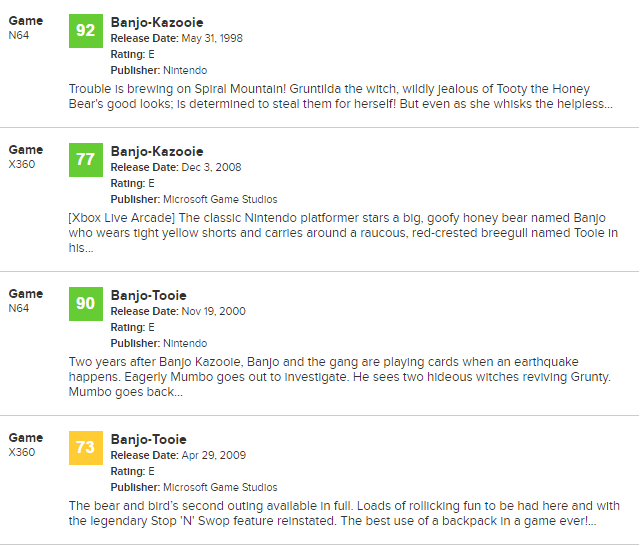No, because this is abotu the more general statements. In fact, I have some reasons to worry about Yooka, because it does not look nearly as tight as Banjo in its design. But the statements are not "Yooka has not executed the collectathon gameplay well", but instead that it is too much stuck in the past and basically complaining about the general style of games, rather than the specific game itself. My question is less about Yooka's individual strengths and weaknesses, because it is obvious that reviewers that disregard the genre in its entirety are not a good source for that (similar to Sonic reviews that are so superficial that you can even see things like IGN being mad about the boost button in Sonic Adventure - which of course does not even exist), it is about the underlying claims about the genre and its classics.
I'm not sure I can agree with your basic premise. Just looking at the Jimquisition review, he starts out with extensively covering basic control and mechanics problems of 1998-era 3D platformers, but then goes into
plenty of detail about why Yooka-Laylee is a bad collectathon too:
"I don't think I've seen a hub world so poorly executed before," most of the stages are
"unimaginative wreckage," "the simple act of moving Yooka around the world is unpleasant," "awful minigames," and
"Many of the puzzles are tricky not because they've been designed to be, but because the game is so terrible at visual communication." And that's just some of his
many detailed examples of the game itself doing the genre poorly.
Sterling also mentions at one point that Mario 64 is fun and suggests people play Snake Pass instead. He might not be overly high on the collectathon genre, but none of his substantial criticisms seem especially focused on the genre.
The Videogamer and Polygon reviews are closer to what you're saying, particularly the latter, but they still go into extensive detail on why this game itself is lousy. There's lots of talk about bad puzzles and poor level design. The genre might be an easy excuse -- and the fact that nobody really makes this sort of game nowadays isn't accidental -- but these reviews are absolutely taking Yooka-Laylee to task for its own failings.
(And yeah, like some others say I think this thread is fairly premature, because all we can actually talk about right now is the genre and maybe review footage. I don't think you were trying to be tricky, but it's predisposing the conversation to the point you're making.)
I'm just gonna jump into this here. I'd argue the reason you sometimes don't understand the reactions to things you like, is because you because you similarly see other things as "right" or "wrong".
The narrowing of focus in 3D Sonic games that occurred since Unleashed is something I would actually consider something the team finally did very right, and allowed the series to play both to the strengths of the character in terms of speed, and also created a very unique brand of platformer that no other IP comes close to providing. The series suddenly stopped being a weaker, mechanically inferior Mario 64, and became a game with its own identity... the best at what it does effectively.
Meanwhile the "Werehog" part that you consider to be "absolutely right" is probably the single aspect within the series to be near universally seen as a negative element by everyone else. It's basically the worst aspects of the Adventure games' side characters, just dressed up as another part of Sonic to disguise it. It was Knack before Knack existed. A rubbish beat-em-up masquerading as a platformer.
So, if we consider that you can look at the "auto-pilot" parts of modern Sonic and deem that something that's "plain wrong", how is it that you can't look at the fact a game is designed almost entirely around being a collectathon, a term used with very little affection these days to describe the ways many games will fill out their worlds with useless fluff, in order to give the impression that the game has significantly more content than it has, by giving the player busywork to do... and realise that's a very large reason many people wouldn't like it. The very concept is something many people would consider "plain wrong" in the many games it still manifests itself in.
This is a great post. (And I'm one of those weirdos who felt the Werehog stuff was mostly fine, just badly paced.) Wandering around nearly aimlessly in mostly empty worlds was only in vogue for a very short period of time.


